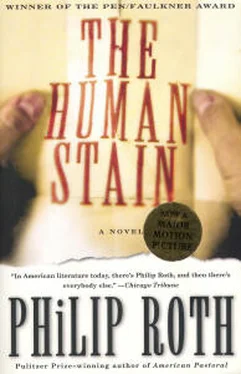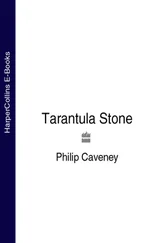And then there was a band — an army infantry band most likely — playing the “Battie Hymn of the Green Berets,” which led Louie to conclude that it was best to wait till the ceremony was completely over before getting Les out of the van. Louie had timed their arrival so they wouldn't have to deal with the speeches or the emotional music, but the program had more than likely started late, and so they were still at it. Looking at his watch, though, seeing it was close to noon, he figured it must be near the end. And, yep — suddenly they were finishing up. The lone bugle playing taps. Just as well. Hard enough to hear taps standing out on the street amid all the empty buses and the cop cars, let alone to be right there, with all the weeping people, dealing with taps and the Wall. There was taps, agonizing taps, the last awful note of taps, and then the band was playing “God Bless America,” and Louie could hear the people at the Wall singing along—“From the mountains, to the prairies, to the oceans, white with foam ”—and a moment later it was over.
Inside the van, Les was still shaking, but he didn't appear to be looking behind him all the time and only occasionally was he looking over his head for “the things,” and so Louie climbed awkwardly back up inside and sat down next to him, knowing that the whole of Les's life was now the dread of what he was about to find out, and so the thing to do was to get him there and get it done with.
“We're going to send Swift in advance, Les, to find Kenny for you. It's a pretty long wall. Better than you having to go through all those names, Swiff and the guys'll go over and locate it in advance. The names are up there on panels in the order of time. They're up there by time, from first guy to last guy. We got Kenny's date, you gave us the date, so it won't take too long now to find him.”
“I ain't doin'it.”
When Swiff came back to the van, he opened the door a crack and said to Louie, “We got Kenny. We found him.”
“Okay, this is it, Lester. Suck it up. You're going to walk over there. It's around back of the inn. There are going to be other folks there doing the same thing we're doing. They had an official little ceremony, but that's finished and you don't have to worry about it. No speeches. No bullshit. It's just going to be kids and parents and grandparents and they are all going to be doing the same thing. They're going to be laying wreaths of flowers. They're going to be saying prayers. Mostly they're going to be looking for names. They're going to be talking among themselves like people do, Les. Some of them are going to be crying. That's all that's there. So you know just what's there. You're going to take your time but you're coming with us.”
It was unusually warm for November, and approaching the Wall they saw that a lot of the guys were in shirtsleeves and some of the women were wearing shorts. People wearing sunglasses in mid-November but otherwise the flowers, the people, the kids, the grandparents — it was exactly as Louie had described. And the Moving Wall was no surprise: he'd seen it in magazines, on T-shirts, got a glimpse on TV once of the real full-sized D.C. Wall before he quickly switched off the set. Stretched the entire length of the macadam parking lot were all those familiar joined panels, a perpendicular cemetery of dark upright slabs sloping off gradually at either end and stamped in white lettering with all the tightly packed names. The name of each of the dead was about a quarter of the length of a man's little finger. That's what it took to get them all in there, 58,209 people who no longer take walks or go to the movies but who manage to exist, for whatever it is worth, as inscriptions on a portable black aluminum wall supported behind by a frame of two-by-fours in a Massachusetts parking lot back of a Ramada Inn.
The first time Swift had been to the Wall he couldn't get out of the bus, and the others had to drag him off and keep dragging until they got him face to face with it, and afterward he had said, “You can hear the Wall crying.” The first time Chet had been to the Wall he'd begun to beat on it with his fists and to scream, “That shouldn't be Billy's name — no, Billy, no!—that there should be my name!” The first time Bobcat had been to the Wall he'd just put out his hand to touch it and then, as though the hand were frozen, could not pull it away — had what the VA doctor called some type of fit. The first time Louie had been to the Wall it didn't take him long to figure out what the deal was and get to the point. “Okay, Mikey,” he'd said aloud, “here I am. I'm here,” and Mikey, speaking in his own voice, had said right back to him, “It's all right, Lou. It's okay.”
Les knew all these stories of what could happen the first time, and now he is there for the first time, and he doesn't feel a thing. Nothing happens. Everyone telling him it's going to be better, you're going to come to terms with it, each time you come back it's going to get better and better until we get you to Washington and you make a tracing at the big wall of Kenny's name, and that, that is going to be the real spiritual healing — this enormous buildup, and nothing happens. Nothing. Swift had heard the Wall crying — Les doesn't hear anything. Doesn't feel anything, doesn't hear anything, doesn't even remember anything. It's like when he saw his two kids dead. This huge lead-in, and nothing. Here he was so afraid he was going to feel too much and he feels nothing, and that is worse. It shows that despite everything, despite Louie and the trips to the Chinese restaurant and the meds and no drinking, he was right all along to believe he was dead. At the Chinese restaurant he felt something, and that temporarily tricked him. But now he knows for sure he's dead because he can't even call up Kenny's memory. He used to be tortured by it, now he can't be connected to it in any way.
Because he's a first-timer, the others are kind of hovering around. They wander off briefly, one at a time, to pay their respects to particular buddies, but there is always someone who stays with him to check him out, and when each guy comes back from being away, he puts an arm around Les and hugs him. They all believe they are right now more attuned to one another than they have ever been before, and they all believe, because Les has the requisite stunned look, that he is having the experience they all wanted him to have. They have no idea that when he turns his gaze up to one of the three American flags flying, along with the black POW/MIA flag, over the parking lot at half-mast, he is not thinking about Kenny or even about Veterans Day but thinking that they are flying all the flags at half-mast in Pittsfield because it has finally been established that Les Farley is dead. It's official: altogether dead and not merely inside. He doesn't tell this to the others. What's the point? The truth is the truth. “Proud of you,” Louie whispers to him. “Knew you could do it. I knew this would happen.” Swift is saying to him, “If you ever want to talk about it...”
A serenity has overcome him now that they all mistake for some therapeutic achievement. The Wall That Heals — that's what the sign says that's out front of the inn, and that is what it does. Finished with standing in front of Kenny's name, they're walking up and down with Les, the whole length of the Wall and back, all of them watching the folks searching for the names, letting Lester take it all in, letting him know that he is where he is doing what he is doing. “This is not a wall to climb, honey,” a woman says quietly to a small boy she's gathered back from where he was peering over the low end. “What's the name? What's Steve's last name?” an elderly man is asking his wife as he is combing through one of the panels, counting carefully down with a finger, row by row, from the top. “Right there,” they hear a woman say to a tiny tot who can barely walk; with one finger she is touching a name on the Wall. “Right there, sweetie. That's Uncle Johnny.” And she crosses herself. “You sure that's line twenty-eight?” a woman says to her husband. “I'm sure.” “Well, he's got to be there. Panel four, line twenty-eight. I found him in Washington.” “Well, I don't see him. Let me count again.” “That's my cousin,” a woman is saying. “He opened a bottle of Coke over there, and it exploded. Booby-trapped. Nineteen years old. Behind the lines. He's at peace, please God.” There is a veteran in an American Legion cap kneeling before one of the panels, helping out two black ladies dressed in their best church clothes. “What's his name?” he asks the younger of the two. “Bates. James.” “Here he is,” the vet says. “There he is, Ma,” the younger woman says.
Читать дальше












